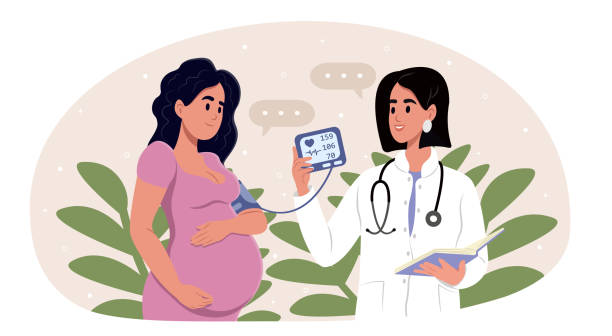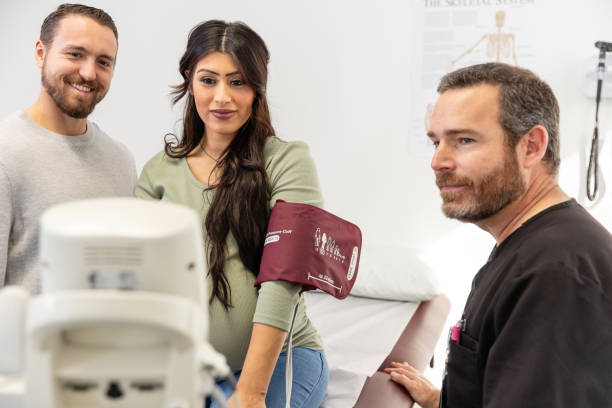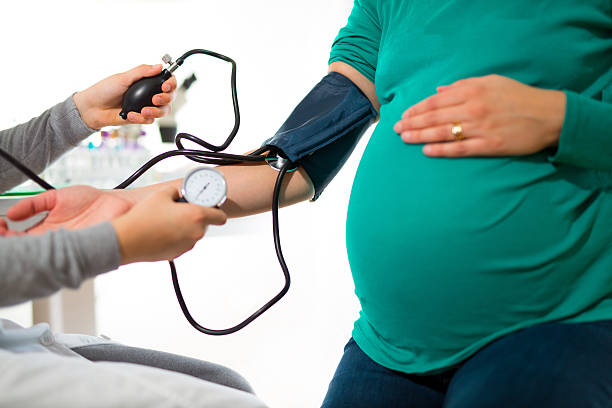Introduction
Pregnancy-induced hypertension, or gestational hypertension, is a condition that develops during pregnancy. This condition usually occurs in the later stages of pregnancy and can lead to pre-eclampsia and pre-eclampsia. In this article, we will understand the problem and highlight its monitoring and management strategies. Through each topic, we’ll explain a complex issue in a simple and informative way so you’ll understand and get help making a deal.
1. What is high blood pressure caused by pregnancy?
Pregnancy-induced high blood pressure, or gestational hypertension, is a condition in which blood pressure rises above normal during pregnancy. It usually develops after 20 weeks and can affect both mother and baby. It is important to diagnose the condition to avoid any serious complications. When blood pressure is 140/90 mmHg or higher, it is called high blood pressure.
2. How Hypertension of Diagnosis?

The evaluation process is quite detailed. Blood pressure is measured at regular intervals, and if persistently high readings are found, further testing is done. Your doctor may also recommend urine tests and blood tests to identify any underlying conditions that may be causing high blood pressure.
3. Signs and symptoms
Some common symptoms of high blood pressure due to pregnancy are: severe headache, blurred vision, abdominal pain, swelling of the hands or feet. Contact your healthcare provider if you experience symptoms. These symptoms may indicate a serious condition and require immediate treatment.
4. Importance of supervision
Monitoring of high blood pressure is very important to keep the condition under control and complications can be avoided. Regular checkups and blood pressure monitoring give your healthcare provider a detailed overview of your health, which helps with timely intervention and treatment.
5. Lifestyle changes
Lifestyle changes play a key role in managing high blood pressure. It is important to incorporate a balanced diet, regular exercise, and stress management techniques into your routine. A low-sodium diet and high-fiber foods help stabilize blood pressure.
6. Medication and Treatment Options
If lifestyle changes do not control high blood pressure, medication is needed. Doctors usually prescribe antihypertensive drugs that are safe during pregnancy. These drugs help regulate blood pressure and reduce the risk of complications.
7. Risk of Pre-Eclampsia and Eclampsia

High blood pressure during pregnancy can be a precursor to pre-eclampsia and eclampsia. Preeclampsia is a serious condition characterized by high blood pressure with proteinuria (excess protein in the urine). Eclampsia is a severe form that can cause seizures. Timely diagnosis and treatment of the condition is very important.
8. Home Monitoring
Home monitoring tools such as blood pressure monitors help you track your condition regularly. This gives you and your healthcare provider real-time updates on your health. Home monitoring makes it easy to identify early warning signs.
9. Regular visits to the doctor
Regular doctor visits help monitor your health and help prevent potential complications. Your doctor will check your blood pressure, urine, and other health measurements so you can receive the appropriate treatment.
10. Adjustment of dosage
Dietary adjustments help manage pregnancy-induced hypertension. It is important to limit salt intake and include potassium-rich foods such as bananas and leafy greens. Healthy fats and lean protein also help control your blood pressure.
11. Exercise and physical activity

Moderate exercise and physical activity help manage high blood pressure. Regular walking, swimming, or pregnancy-safe exercise can improve your overall health and blood pressure. Exercise also relieves stress, which reduces the risk of high blood pressure.
12. Stress management techniques
Stress can also raise blood pressure, making stress management techniques a part of your daily routine. Yoga, meditation, and deep breathing exercises give you relaxation and mental well-being, which help control high blood pressure.
13. Importance of support system
Support systems, such as family and friends, also play an important role in managing high blood pressure. With emotional support and practical help, you can work through stress and manage your health better. It is important to let your loved ones know about your condition.
14. Postnatal care
It is important to monitor high blood pressure even after pregnancy. In some women, high blood pressure continues into the postpartum period. Regular check-ups and follow-up visits ensure that your condition is improving and there are no complications.
15. Future pregnancies and precautions
If you are planning a future pregnancy, it is important to consider previous episodes of high blood pressure. Discuss cranes and precautions with your health care provider to prevent complications in future pregnancies. Proper planning and monitoring will help you experience a healthy pregnancy.
Conclusion
Pregnancy-induced hypertension can be a serious condition that can be effectively managed with timely monitoring and management. Will the points discussed in the article help you understand and manage this condition? You want to ensure the health of you and your baby through regular communication with your health care provider and appropriate interventions.
